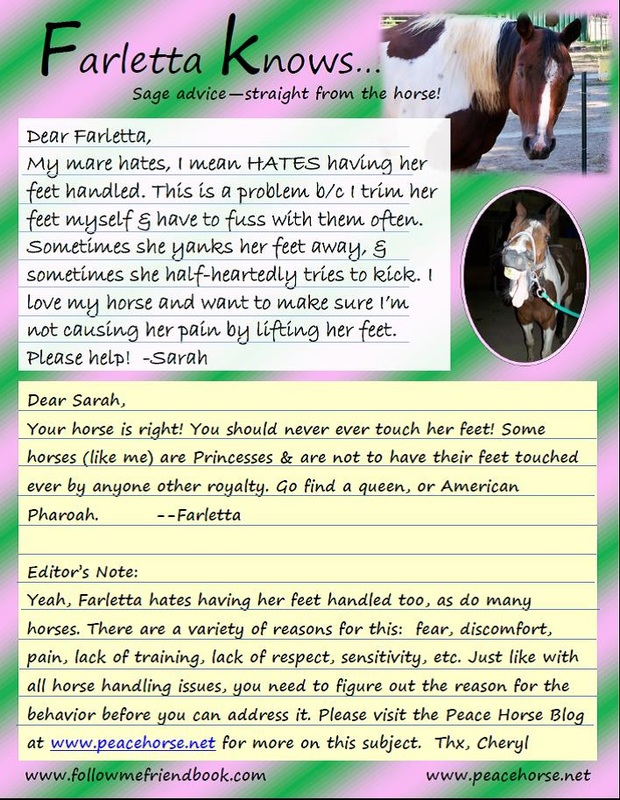|
I was recently contacted by an owner who has difficulty with handling her horse’s feet. The mare gives her feet readily but will snatch them away and sometimes “half-heartedly kick” at her. Unfortunately, many people resort to force or punishment to “fix” this problem. However, this seldom yields positive or lasting results.
Any time you have a behavioral problem (in any animal or human), it is best to address it from a holistic perspective. This means taking into account all potential “inputs” into a given situation. For the horse this includes environment, relationships (horse and human), nutrition, training, overall health, etc. If you don’t resolve the cause(s) of the behavior, it will either return, or the horse will deal with the stressor with another negative behavior (for example: use a cribbing collar to stop a cribber, he then starts weaving or stall-kicking). In the case of a horse that does not like her feet handled, here are a few things you can look at to take a holistic approach to solving this behavior problem: Training – this may seem obvious but the first thing to look at is if the horse has been trained to have her feet handled. By trained I don’t mean you’ve tried a couple times and had some success at forcing her feet up. The trained horse understands exactly what is expected from her and will readily offer her feet with little effort on the part of the handler. Comfort—this refers to physical, emotional, and environmental comfort:
Balance—this goes with physical comfort and sometimes emotional comfort. If you have the opportunity, watch other people handle their horse’s feet. Pay attention to what the horse does when the handler asks for a foot. With an experienced horse, you will likely see the horse position himself for optimal balance before giving the hoof. This usually involves repositioning one foot before the horse offers the hoof being asked for. An inexperienced (or ignorant) handler will sometimes punish this behavior resulting in an insecure and un-trusting horse. It is especially important while training the horse that you give her the chance to reposition her feet for optimal balance. Pay attention, it is likely your horse is doing (or trying to do) this without your being aware! If you’ve addressed and solved (or ruled out) all of the above, it is possible you have a horse that simply doesn’t like having her feet handled or is a little (or a lot) spoiled. Having an extra set of eyes (a trainer or a competent horse friend) can help you identify the problem. Also look at other areas of your work with your horse. If there are other places where you have behavior issues (leading, tying, standing still while mounting) you may find working on these areas will solve your hoof-handling problems. Remember, training is a process and a well-trained horse is built on a broad and solid foundation. If there are holes or weak spots in your foundation, it will show up in other areas of your work together. Do you have a horse question? Click here to ask or visit Farletta Knows on Facebook!
2 Comments
|
AuthorCheryl L. Eriksen, MSW, Equine Enthusiast, EAGALA groupie and writer of interesting, educational and entertaining blog posts! Archives
April 2021
|

 RSS Feed
RSS Feed
